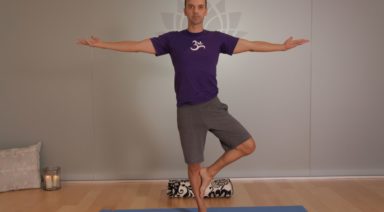8 Reasons Why Yoga Makes You Happier and Healthier

Develop Superpowers With Yoga
Yoga stretches the body, supports circulation, flushes the lymphatic system and stimulates major organs. It also alleviates common ailments and may be considered preventative medicine.
1. Reduce Pain
According to Harvard Health Publications, several studies found that a weekly yoga practice can reduce lower back pain and may be more effective for addressing pain than standard medical care or exercise therapy. Yoga improves the daily function of people struggling with curvature of the spine due to fibromyalgia and osteoporosis-related conditions.
2. Alleviate Anxiety
Anxiety has become one of the most common disorders in the US and studies have shown that yoga may be more effective, and possibly less expensive, than pharmacological treatment in alleviating symptoms, according to a 2007 study published in Evidence-Based and Complementary Alternative Medicine. The study found that a yoga session increased brain Γ-Aminobutyric (GABA) levels by 27 percent in yoga practitioners; anxiety and depression are traditionally associated with low GABA levels.
While yoga may not erase all attachments to a painful past, another study found that it can promote healing for people with Post-Traumatic Stress Disorder (PTSD) through peaceful embodiment and an awakened sense of calm.
3. Get Out of the Clouds
Conducting scientific studies to prove that a yoga class has a positive effect on the mood may seem unnecessary to a dedicated yogi but nonetheless, when those who struggle to get out of bed manage to muster the strength to strike a pose and breathe through the low point, the effort is proven to uplift.
Researchers at UCLA, Moscow Research Center of Narcology and University of Bologna, found that, of the 17 subjects that completed the study: 1) all experienced significant reductions in anger, depression, neurotic symptoms and low frequency heart rate variability; and 2) 11 of the 17 subjects achieved remission levels post-intervention. Not only does yoga have the power to reduce depression, but it is potentially a practice that can sustain improved mental health.
4. Reduce Risk of Cardiovascular Disease
According to a 2014 study published by the European Journal of Preventative Cardiology, adults involved in a yoga practice, compared to those who did not exercise, exhibited improvements to body mass, weight, blood pressure and cholesterol, over time. The evidence is promising for cardio-metabolic health.

5. Improve Quality of Life for Cancer Survivors
Many studies explore quality of life impacts, as well as psychosocial and symptom-management benefits, of yoga as an intervention tool, usually with positive findings. For example, a 2012 study published in the journal of Evidence-Based and Complementary Alternative Medicine supported preliminary evidence of the significance of yoga for improving quality of life and symptoms in cancer survivors.
6. Improve Gene Expression
According to a 2013 study conducted by researchers at the University of Oslo and Oslo University Hospital, yoga can improve gene expression, especially in terms of immune function. Experimental sessions of gentle yoga postures, breathing exercises and meditation had a significantly greater effect on gene expression in peripheral blood mononuclear cells of subjects, compared with the control group protocol of walking in nature and listening to relaxing music.
Nature explains that, “genes encode proteins and proteins dictate cell function.” Gene expression refers to the ability of DNA to replicate, express and repair itself. Improved gene expression may be connected to improved immune function, cellular integrity and adaptability, in the evolutionary sense.
7. Support Smoking Cessation
Yoga may squash cravings in general but it has also been proven to reduce perceived stress and negative affects associated with smoking cessation, according to a 2012 study published in the Journal of Women’s Health.
8. It’s Never Too Late
It is never too late to get started or resume your yoga practice. Patanjali’s first Yoga Sutra states “Now begins the practice of yoga.” Remove the limitations that you identify with from the past, as well as your expectations for the future, and just get on your mat.
An Ancient Practice That Can Heal
Stress has become a way of life. Whether the days are full of multiple goals and endless obligations, traffic jams and transit delays, complex systems of bureaucracy and finance, or an overwhelming array of in-person and virtual relationships, the pace of current human existence is bursting at the seams.
“Yoga has the power to heal the world, one human at a time.”
For centuries, sages have relied on yoga to transcend earthly limitations. Each meditative pose is an effort to identify pockets of pain that accumulate inside the body. Each inhale confronts suffering. Each exhale is an attempt to transcend it. Through this process, worry is replaced with loving kindness. Now, bodies of research are proving that yoga is more than a niche spiritual force for particularly enlightened beings.
3 Exercises to Focus Your Mind

The Power of Presence
Any and all humans are susceptible to the incessant chatter of the mind. Add school, business or any other responsibility and that chatter grows from a split conversation to a whole town meeting. If you are trying to do eight things at once, dreading or projecting their outcomes, how can you even come close to performing the current task at your full potential? Herein lies the power of presence.
Meditation. 90% of people have heard the word, a portion of those maybe have even adopted the courage to sit down and quiet their thoughts, but I am going to go out on a limb here and say that upon sitting down, your experience went as follows. You sit down and think to yourself, “Stop thinking, stop thinking. No thoughts. Blank. This is really uncomfortable. Did I lock the door? Ah!”
It’s so common! My experience guiding meditation has shown me that the fear of that experience itself is what keeps people from centering their focus and calming their mind. I am here to debunk your story and offer a few tips that will give you power in the present moment.
Meditation can happen anytime that you are focusing on one thing and one thing only. That thing does not have to be bliss but can be your talk that you are writing, the conversation you are having or even the food that you are eating.
Here are 3 Exercises to Focus Your Mind (and Grow Your Business):
- Try taking a bite of next meal and notice everything about the experience. Notice the rush of flavors as you chew, delight in the pleasure hormones your brain releases. As you swallow, feel the chewed up food move down the throat, following it as far down as you can. That is a meditation.
You cannot control your brain but you can train it. The brain is a rabid dog at times that runs wildly eating up all of your good intentions. Try to tell yourself to think a certain thought or feel a specific emotion and take notice of the pop up bubble that says, “yeah, but what if it doesn’t work?”, “mm.. that is a great thought but it’s probably not true”. Do not fret, like a wild dog, it can be tamed. When those negative thoughts do start to appear, you have the power to direct them back to where they belong.
- When you are working on something and a thought raids your focus, write it down. Make a note to come back to it. Take a breathe. Refocus on your current task. Resume. (You may have to do this 100 times when you begin but after a while you will notice the thoughts interrupt less and less).
Practice reassuring yourself of the power of presence. A huge part of fear, whether it is public speaking or handing in your final project, is imaginary future projections. We create huge, disastrous events in our mind from things as small as typing on a piece of paper. Will people really boo you? Not likely. Will your teacher tear up your paper in a flurry of disgust? Improbable. You cannot control what happens in the future, you only have control of what you do at this exact moment. Your teacher is not shredding any reports in this moment so bring your focus to what does matter right now because what you are doing at this exact moment is not hard.
- Break it down. Is walking into an office hard? No. Is putting together a sentence terrifying? NO! Presenting a concept and conducting an interview is just that. Rather than projecting a situation into an event, focus on each small part that makes up that event and remind yourself of the power that you have in the present.




































